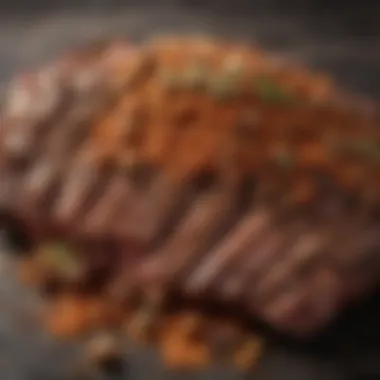The Grill Father: Mastering the Art of Grilling


Intro
Grilling is more than mere cooking; it is an art form, steeped in history and culture. The title of "The Grill Father" reflects depth of knowledge and skill that can transform ordinary ingredients into extraordinary culinary experiences. This guide aims to dismantle this art into digestible sections, making it accessible for both novices and proficient cooks.
Beyond just simple barbecues, grilling encapsulates a shared experience, bringing families and friends together around the grill. Emphasizing authenticity, this discourse will outline essential techniques, equipment, and cultural significance behind grilling. In delving into these elements, we cultivate a deeper understanding that enhances not just cooking proficiency, but also appreciation for this time-honored tradition.
Preface to Grilling Culture
Grilling is more than a cooking method; it is a cultural phenomenon that spans centuries and continents. Understanding the culture surrounding grilling adds depth to the experience of preparing food outdoors. Grilling brings people together, creating a unique environment where culinary skills and social interaction come into play. In this section, we explore two fundamental aspects of grilling culture: its historical significance and its role as a social activity.
Historical Context of Grilling
The history of grilling can be traced back to ancient civilizations. Archaeological evidence suggests that humans have been cooking over open flames for thousands of years. This primal method of food preparation allowed for the enhancement of flavors and the preservation of meats. The techniques of grilling evolved as different cultures adapted the process to include various marinades, spices, and cooking methods.
In many cultures, grilling is tied to traditions and rituals. For example, the barbecue culture in the Southern United States has roots in indigenous practices. Over time, grilling has become a cherished tradition in numerous societies worldwide, where it signifies festivity and togetherness. The evolution of grilling methods—from open flames to gas and charcoal grills—reflects changes in technology and culinary preferences but the essence of grilling remains the same: a communal experience centered around food.
Grilling as a Social Activity
Grilling often transforms simple cooking into a social event. It serves as a gathering point for family and friends, fostering connections through shared meals. The act of grilling allows people to come together in an informal setting, encouraging conversations and exchanges while enjoying the outdoors.
The preparation and cooking process can also engage participants. It invites people to contribute, whether by selecting ingredients, marinating meats, or managing the flames. This interaction enhances the overall experience, making it memorable for all involved.
Moreover, grilling has adapted to modern challenges, such as busy lifestyles. Communities organize events around grilling, and social networks amplify the sharing of recipes and tips. This contributes to a widespread appreciation for grilling, thereby reinforcing its status as a favored pastime.
"Grilling is not just about cooking; it embodies a lifestyle that celebrates togetherness and joy in food."
Grilling intertwines history and social interaction, showing its significance beyond mere cooking. As we move forward in this exploration of grilling mastery, it is essential to appreciate both the historical context and social impact that grilling brings to our lives.
The Grill Father Concept
The concept of the Grill Father represents more than just a title; it signifies a mastery of grilling techniques, an understanding of culinary principles, and a deep appreciation for the social aspects of outdoor cooking. This section explores what it means to be a Grill Father, focusing on elements that elevate the grilling experience and solidify one’s reputation as an expert in this domain. A Grill Father is often seen as a mentor, guiding others, sharing knowledge, and creating memorable moments through the act of grilling. This role embodies both skill and passion, showing how these attributes can be cultivated over time.
Defining the Grill Father
To define the Grill Father, one must consider various traits and responsibilities associated with this role. The Grill Father is not merely a versatile cook; rather, they are an embodiment of tradition, skill, and love for food. They often possess:
- Extensive Knowledge: They understand different grilling methods, types of equipment, and ingredient pairings.
- Technical Skill: Mastery over cooking temperatures, timing, and proper techniques is essential for success.
- Leadership: They guide and inspire others, often leading gatherings and sharing their expertise.
- Creativity: Experimenting with flavors and techniques helps create unique dishes that leave a lasting impression.
Understanding this definition allows one to appreciate the expectations tied to being recognized as a Grill Father. This title brings a sense of pride and responsibility, demanding continuous learning and improvement.
Principles of Effective Grilling
Effective grilling is anchored in several foundational principles that every aspiring Grill Father should adopt. This section outlines key techniques that enhance the grilling experience, ensuring delectable outcomes. The core principles include:
- Know Your Grill: Whether it’s a charcoal grill, gas grill, or a smoker, intimate knowledge of your equipment leads to better control over heat and cooking.
- Preparation is Key: Effective grilling requires thorough ingredient prep, including marination and proper seasoning. This shapes the flavors and ultimately impact the final dish.
- Temperature Management: Understanding how to manage direct and indirect heat is crucial. Each method affects how meat cooks, resulting in the right texture and flavor.
- Patience and Timing: Great grilling takes time. Rushing can lead to overcooked or unevenly cooked food. Learning the right times for different cuts of meat and veggies will refine your skills.
- Resting the Meat: Letting cooked meats rest allows juices to redistribute, which enhances the flavor and tenderness.
"Grilling is not just about cooking; it’s about creating experiences and memories."
By adhering to these principles, individuals not only improve their grilling skills but can also approach grilling as a thoughtful process. The Grill Father concept thrives on elevating the craft, fostering connections, and creating enjoyment in every bite.


Essential Equipment for Grilling
The foundation of successful grilling lies in having the right equipment. Essential equipment for grilling not only influences the outcome of your food but also enhances the experience itself. A good grill, appropriate tools, and protective covers form the trinity of effective setup. Each element plays its own role that can significantly impact cooking results. Proper equipment takes away unnecessary stress and makes achieving top-notch grilled flavors more accessible.
Grills: Charcoal vs. Gas
When it comes to choosing a grill, the debate between charcoal and gas is ongoing. Charcoal grills are often favored for their ability to impart a distinct smoky flavor to the food. They require patience and skill in managing temperatures, which can appeal to those who enjoy crafting their cooking technique. On the other hand, gas grills offer convenience and precise temperature control, making them suitable for quick meals. Understanding the benefits and drawbacks of each type is essential for making an informed decision. Ultimately, the grill you choose should align with your personal cooking style and preferences.
Tools and Accessories
Utensils
Utensils are a crucial element in the grilling process. A good set of utensils includes tongs, spatulas, and brushes. These tools allow for better handling of food on the grill, minimizing the risk of burning or losing delicate ingredients. High-quality utensils are typically made from stainless steel. They are durable and can withstand high temperatures without warping. Choosing utensils that are long enough helps in keeping a safe distance from flames, which adds an element of safety too.
Thermometers
Thermometers are indispensable for anyone serious about grilling. Understanding the internal temperature of meat ensures it is cooked safely and to desired doneness. Instant-read thermometers allow for quick checks, giving confidence that meat is ready. Some thermometers, like probe models, can be left in during cooking to monitor temperature continuously. While basic models serve well, investing in a more sophisticated digital thermometer can increase precision. This precision is essential for mastering grilling techniques effectively.
Grill Covers
Grill covers play a notable role in protecting your investment. They shield your grill from the elements, preventing corrosion and damage from rain or sun. A cover that is breathable ensures moisture cannot build up, leading to rust. Choosing the right fit is vital; a properly fitted cover minimizes wind damage and flapping, extending the lifespan of your equipment. However, it is essential to maintain the cover itself by cleaning it regularly.
Selecting Ingredients
Selecting the right ingredients is crucial in grilling. The flavors and textures of what you cook profoundly influence the outcome of your dish. Quality ingredients provide a foundation for successful grilling. They enhance the overall flavor, texture, and presentation of the meal.
Choosing Quality Meats
When it comes to grilling meat, quality is paramount. Look for meats that are fresh and have a good degree of marbling. This marbling is where fat intersperses within the lean part. It melts during cooking, keeping the meat juicy and flavorful. Options like ribeye steak, chicken thighs, and pork tenderloin can provide excellent results if chosen wisely.
Consider the cut, too. Different cuts have different characteristics. For example, a sirloin is leaner and can dry out if cooked too long. In contrast, brisket is tough but turns deliciously tender when smoked for hours. Pay attention to local sources that offer organic or grass-fed options. These meats often have a richer flavor profile and are often better for your health.
Realizing flavor is just as important as cooking skill. A great chef cannot make mediocre meat taste extraordinary. Always search out the best.
Vegetable and Side Dish Options
Vegetables can transform a simple meal into something exceptional. Grilled vegetables offer a distinct flavor that roasted or boiled ones often lack. Chose seasonal vegetables. Vegetables like zucchini, bell peppers, and asparagus hold up well on the grill. They can add color and flavors, making for a visually appealing plate.
Don't forget about sides. Items like potato salad or grilled corn on the cob can complement your main dish splendidly. Furthermore, marinating the vegetables in olive oil, garlic, and herbs allows richer flavors. Grilled fruit, such as pineapple or peaches, can serve as a delightful addition or dessert.
A good grilling experience requires attention to detail both in the main course and its sides. By selecting the freshest and highest-quality ingredients, you set the stage for a successful grilling adventure.
Marinades and Rubs
Marinades and rubs are essential components in the practice of grilling. These preparations not only add flavor but also help to tenderize meats and highlight their natural qualities. Proper use of marinades and rubs can elevate a grilling dish from ordinary to extraordinary, giving it depth and richness that might otherwise be absent. Understanding the nuances of both techniques provides an advantage for any grill aficionado.
Creating Flavorful Marinades
Flavorful marinades are more than just seasoning; they are a harmonious blend of ingredients that work together to enhance the taste and texture of grilled foods. There are several elements that form the foundation of an effective marinade. Typically, a marinade consists of an acid, oil, and various aromatics. The acid, which can be vinegar, citrus juice, or yogurt, helps to break down proteins in the meat, making it more tender. Common cooking oils, such as olive oil or canola oil, act as carriers for flavors while also adding moisture. The choice of aromatics—herbs, spices, garlic, and onions—adds depth and complexity.
Creating a marinade is a straightforward process:
- Choose Your Base: Select an acidic component, like lemon juice or balsamic vinegar.
- Add Oil: Consider using an oil like extra virgin olive oil to give richness.
- Incorporate Flavors: Add herbs like rosemary or thyme, and spices like paprika or cayenne for heat.
- Mix Well: Combine all ingredients thoroughly to ensure uniform flavor distribution.
- Allow to Marinate: Place your meat or vegetables in the mixture and let them soak for a period, usually 30 minutes to overnight, depending on the recipe and desired intensity.


Using a well-balanced marinade results in grilled meats that are succulent and flavorful.
Understanding Dry Rubs
Dry rubs are another strong ally for those who want to infuse bold flavors into their grilled dishes without altering the texture of the meat significantly. A dry rub consists of a mixture of spices and herbs that are directly applied to the surface of the meat. Unlike marinades, dry rubs do not include liquid components, which allows them to form a crust during the grilling process, enhancing both taste and presentation.
When preparing a dry rub, consider the following:
- Spices and Herbs: Common choices include salt, pepper, garlic powder, onion powder, paprika, cumin, and brown sugar. Each contributes unique flavor elements.
- Balance: Striking a balance between sweet, savory, and spicy is crucial. For example, combining sugar with spices can create a caramelized crust.
- Application: Generously apply the rub to the meat, making sure to cover all surfaces. For optimal flavor, let the rub sit on the meat for at least 15 minutes or up to several hours.
Using dry rubs allows for maximum flavor retention, perfect for those who appreciate a crusty texture on grilled proteins, while also providing a simple and easy preparation method.
In summary, both marinades and dry rubs play a vital role in mastering the art of grilling. Employing these techniques can lead to remarkable improvements in flavor and texture, ensuring that every grilling session yields delicious results.
Grilling Techniques
Grilling techniques are crucial for any serious cook aiming to master the craft. They not only determine how well food is cooked but also enhance the flavors and texture. Understanding these techniques can elevate an average grilling experience into a remarkable culinary occasion. Each method studied here has distinct purposes and applications which, when used correctly, contribute significantly to the final outcome.
Direct vs. Indirect Grilling
Direct grilling involves placing food directly over the heat source. It is ideal for cooking food items that require quick cooking times such as burgers or steaks. This method imparts a nice char and grilled flavor. However, it requires vigilant attention to prevent overcooking or burning.
On the other hand, indirect grilling is suitable for larger cuts of meat like ribs or whole chickens, where prolonged cooking at a lower temperature is needed. In this method, food is placed away from the heat source, allowing it to cook evenly without the risk of charring. This technique mimics oven roasting and results in tender, juicy meats.
Using a combination of both methods can yield great results. Start with direct grilling to sear the meat and develop flavor, then switch to indirect grilling to finish cooking through.
Perfecting the Grill Marks
Grill marks are more than just visual appeal; they indicate proper searing and flavor development. To achieve these desirable lines, several factors should be considered. First, the grill needs to be preheated adequately; a hot grill sears quickly, creating a crust and locking in moisture.
Next, it is essential to place the meat at a 45-degree angle to the grates. This angle allows for the optimal crosshatch pattern. Timing is also key; avoid moving the meat too soon or too late. When it's time to flip, the meat should release easily from the grill surface, indicating a good sear.
"Mastering grill marks is not just an art; it’s a science that every Grill Father must explore."
Using Smoke for Flavor
Smoke adds a unique depth of flavor that cannot be replicated through other cooking methods. To utilize smoke effectively while grilling, first choose the right type of wood. Popular choices include hickory, mesquite, and applewood, each providing distinct flavors. Soaking wood chips in water before placing them on the grill can prevent them from burning too quickly.
The placement of the wood is equally important. For gas grills, placing wood chips in a smoker box or wrapping them in aluminum foil and poking holes for smoke to escape can work well. On charcoal grills, coals can be mixed with wood chunks for that desired effect.
The duration of smoking also plays a role. Longer smoking times will deepen the flavor, but care should be taken not to overpower the food. A gentle smoke is often more pleasing than an overwhelming one, allowing the natural flavor of the ingredients to shine through.
Safety and Maintenance
Safety and maintenance play a crucial role in grilling. They ensure that not only is your grilling experience enjoyable, but also that it is free from potential hazards. Understanding and implementing safe practices can significantly reduce risks, such as fire hazards or foodborne illnesses. Likewise, regular maintenance of your grill protects your investment and prolongs its life, enhancing your cooking experience every time. Below, we explore key aspects of safe grilling and proper maintenance to elevate your skills and enjoy the cooking process.
Safe Grilling Practices
Grilling is a delightful experience, yet it comes with certain risks. To mitigate these, it is essential to adopt safe grilling practices:


- Keep Your Grill Clean: Regularly remove grease and food residue. A clean grill helps prevent flare-ups and ensures even cooking.
- Maintain a Safe Distance: Position your grill at least 10 feet away from your home and other structures. This distance can help prevent accidents in case of fire.
- Use the Right Tools: Employ long-handled utensils to keep a safe distance from the heat. These tools also give you more control while handling food.
- Monitor the Grill: Never leave a lit grill unattended. It is important to keep an eye on it at all times to avoid unexpected incidents.
- Cook at Recommended Temperatures: Ensure meats are cooked to safe internal temperatures to prevent foodborne illnesses. For example, ground beef should reach 160 degrees Fahrenheit.
- Have a Fire Extinguisher Ready: In case of an emergency, having an extinguisher nearby can aid in controlling small fires quickly.
"Prior planning and safety measures make the grilling experience more enjoyable and stress-free."
By following these practices, you can ensure that your friends and family have a safe and enjoyable grilling experience.
Cleaning and Maintaining Your Grill
Regular cleaning and maintenance enhance your grill's performance. To keep your grill in optimal condition, follow these guidelines:
- Pre-Heat Your Grill: Before cleaning, pre-heat your grill on high for 15 minutes. This helps to burn off any food debris.
- Scrub the Grates: Use a grill brush designed for your grill type. This removes buildup and residue effectively.
- Empty the Grease Trap: Check and clean the grease trap regularly to prevent flare-ups and ensure proper function.
- Inspect Burners and Hoses: Look for any signs of wear or leaks in your gas grill. A simple soap and water solution can help identify leaks.
- Cover When Not in Use: Use a grill cover to protect it from the elements. This prolongs the life of your grill and reduces cleaning time.
- Check for Rust: Inspect your grill for rust. If any is found, sand it down and apply a high-heat paint as necessary.
The Social Aspect of Grilling
Grilling serves as a much more than a culinary endeavor; it acts as a powerful social catalyst. Many gatherings revolve around the grill, transforming a simple meal preparation into a shared experience. This section explores the significance of the social aspect of grilling and touches on various elements that enhance communal ties.
The act of grilling invites friends and family to gather, share stories, and build memories. This communal environment fosters relationships. Not only does it bring people together for a meal, it encourages conversation and a sense of belonging. Each sizzle from the grill adds to the atmosphere, promoting an engaging environment where individuals can cultivate friendships.
Inviting Guests: Etiquette and Tips
When inviting guests over for a grilling session, proper etiquette becomes important. One key consideration is making sure your guests feel welcome and included. Here are some essential tips:
- Send Invitations Early: Ensure your guests have enough time to plan their attendance.
- Ask About Dietary Restrictions: This shows consideration and ensures everyone can enjoy the meal.
- Offer to Bring Items: Encourage guests to contribute drinks or side dishes, creating a participatory atmosphere.
- Engage with Guests: Take time to talk with everyone, moving around rather than staying by the grill. This fosters connection and makes all feel valued.
Grilling is often a relaxed experience, but it's crucial to maintain an inviting environment. Guests appreciate a laid-back setting.
Creating a Grilling Community
Building a community around grilling can elevate the experience significantly. This involves gathering individuals who share a passion for outdoor cooking and who can share tips and recipes. Some ways to create such a community are:
- Hosting Regular Grill Nights: Make it a routine. Consistency fosters familiarity and strengthens connections.
- Engaging Online: Join groups on platforms like Reddit or Facebook dedicated to grilling. Sharing experiences online can form a wider network.
- Collaboration on Recipes: Encourage members to bring and share unique recipes. This can spark creativity and improve grilling skills for all involved.
- Organizing Competitions: Arrange friendly grilling contests, which can bring excitement and motivation to improve one's skills.
"Grilling unites not just meals but hearts and minds, creating bonds that go beyond mere food preparation."
Through these practices, one can foster a thriving community. The bonds formed during these grilling events often translate beyond the grill, enriching lives and creating lasting friendships. In essence, the social aspect of grilling is not just about the food; it’s about the connections that food facilitates.
Finale: The Grill Father's Legacy
The celebration of grilling extends beyond the simple act of cooking food over flames. It represents a fusion of skill, culture, and community. As we reflect on 'The Grill Father,' we acknowledge the legacy that encompasses not only the flavors but also the techniques honed through time. Grilling is an intricate dance of preparation, execution, and enjoyment. It bridges generations, providing a space for learning and sharing. This legacy is vital as it elevates grilling from a mundane activity to an art form, worthy of respect and admiration.
Reflections on Grilling Skills
Grilling skills are often passed down through family tradition. They embody patience, knowledge, and passion. As one navigates the grill, numerous variables come into play—heat management, timing, and ingredient selection. Each cook develops a unique approach, shaped by their experiences.
Reflecting on one's grilling skills can prompt the following questions:
- What techniques have been particularly effective?
- Have specific ingredients or flavor profiles become signatures?
- How has experimentation led to personal growth as a cook?
This reflection is important for continuous improvement. Mastery in grilling involves constant learning and adapting. It invites grillers to explore new methods and flavors, pushing the boundaries of traditional practices.
Passion for the Grill: A Lifelong Journey
Embracing grilling as a passion can lead to a lifelong journey. This journey is not just about the grill, but about community and culture. The process of grilling encourages gathering around the fire, which fosters bonds. Conversations bloom over the sizzling sounds of grilling food. Such moments stay etched in memory, showcasing the power of food in nurturing relationships.
Pursuing grilling as a passion includes:
- Experimentation with different cuisines and techniques: Exploring various flavors can lead to richer experiences.
- Engaging with fellow grill enthusiasts: Sharing knowledge and experiences can enhance the love for grilling. Online platforms like Reddit or Facebook can connect individuals with similar interests.
- Continuously seeking improvement: Mastery is never fully attained. Each cook can always learn new methods or tricks, driven by interest and necessity.







